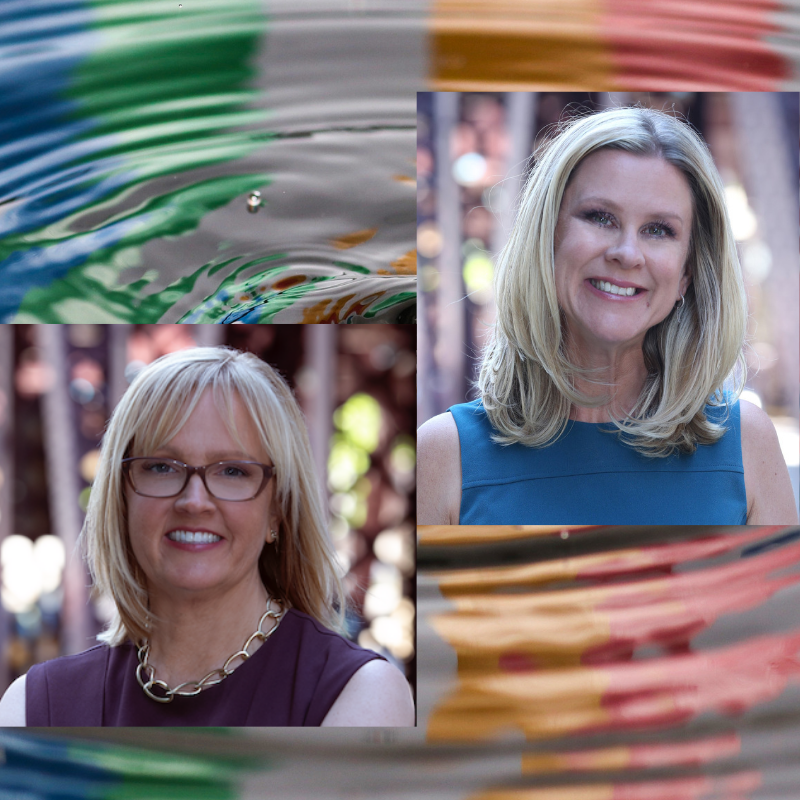As the Chicago Chapter Chair for the Women Presidents’ Organization, a peer learning organization for female business owners running multimillion-dollar businesses, I have the privilege and opportunity to facilitate monthly business meetings. At these meetings, we discuss business issues, challenge the status quo, and solve pressing problems – all with the goal of driving better decisions and better results (while accelerating business growth). One topic that always pops up is “what should we be doing to pay it forward for others?” Two leading female entrepreneurs weigh in – one with a focus on her employee relationships and the other with a focus on making an impact for people.
Kim Robinson (pictured left) is the CEO of FrontlineCo, which provides association management and public affairs services to not-for-profits, corporations and governments.
I think small business owners pay it forward every day in ways that bigger businesses may not. I get frustrated when I see lawmakers and regulators make uninformed decisions based on the belief that business owners cannot be trusted to take care of their employees. We know our customers and our employees on a granular level. Small business owners know fundamentally that employees are the key to our success. Whether working in a tight labor market or not, turnover costs every company time, money and focus.
I have worked to build long-term relationships with my employees. That means that I have often put their needs before profit. When someone wants to move to another city, for example, I arrange a remote working arrangement. If an employee wants to return to school, I set up an alternative, part-time work arrangement. If someone wants to cut back on hours to travel, or wants to undertake project-based work, I make that happen. If they want to leave to pursue another opportunity, I wish them well and welcome them back if it doesn’t work out. The point is, I work to keep my ego out of it when an employee wants to pursue something different. I’ve been rewarded many times by great employees who’ve come back to the team, who’ve introduced me to new clients and who have spoken supportively of their time with my company. We have a saying, “once a Frontlinian, always a Frontlinian.” I view my relationships with employees as ongoing, whether or not they are actually employed at the moment. These relationships ebb and flow over time — often many years.
Of course, sometimes a relationship runs its course or just doesn’t work for one or both parties. Unless an employee has broken the law or treated a co-worker or a client badly, I try to be as fair as possible and work with him or her to find another opportunity.
Sandy Marsico (pictured right) is the CEO of Sandstorm, a brand experience agency specializing in marketing strategy, user experience, web development and data science.
Entrepreneurs can be idea generators, problem solvers, dreamers and mentors. We have the unique opportunity to make an exponential impact on others.
At Sandstorm, our mission is to do good work for good people. And my purpose as our CEO is to provide great jobs to great people. It’s a small way I can make a big impact in someone’s life. This got me thinking – how can I expand my personal purpose beyond what my company can provide? As I looked around our creative, lofted office space, there was a spare desk here or there, which allowed room for growth but was underused. So I had an idea … What if I provided a desk and some shared office space (at no cost) to a budding female entrepreneur who just needed a break, who needed someone to give them a place to root and grow, to simply believe in them enough so they believe in themselves? Why not start an incubator within our own office space?
I ran the concept past my executive team and we decided to pilot the program. At our company meeting, I introduced our first start up business and entrepreneur, a crazy-talented female CEO who had just launched a fast-growing commercial and residential solar company. Not only is she a ray of sunshine at the office, but we’re her biggest cheerleader. We invite her to our company lunches, and she even contributed to our New Years resolution wall.
At the pace she is growing, she will be financially ready to move to her own space within 12 months and, within 18 months, she will have already hit her first $1 million, providing good jobs for good people as well.


